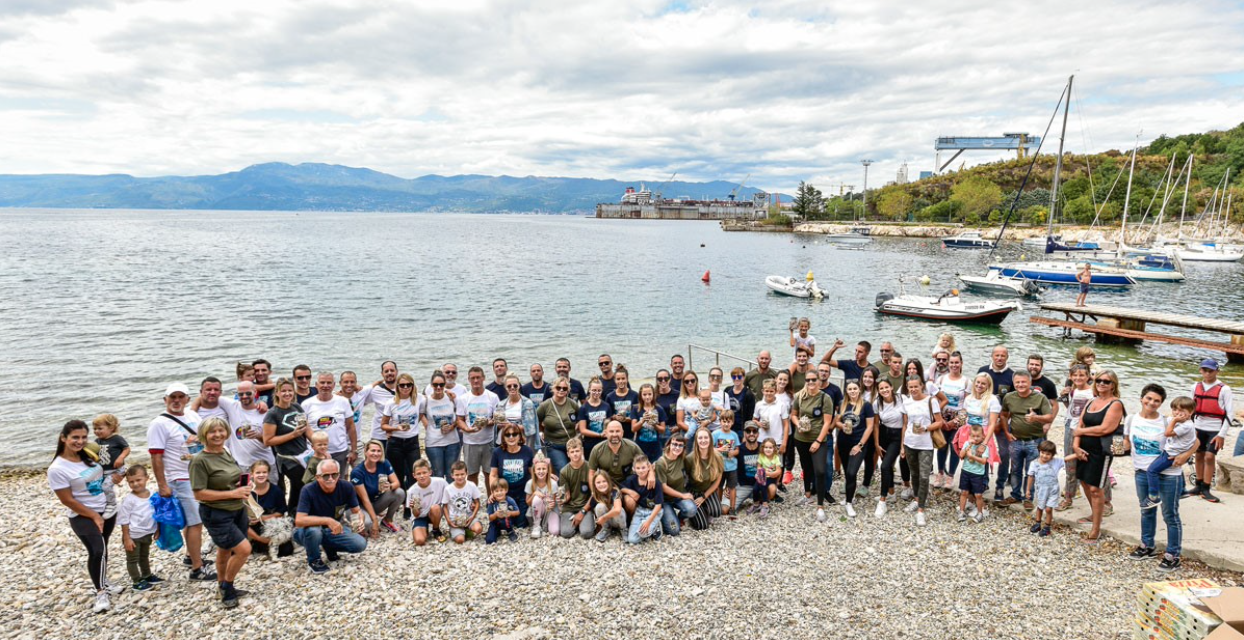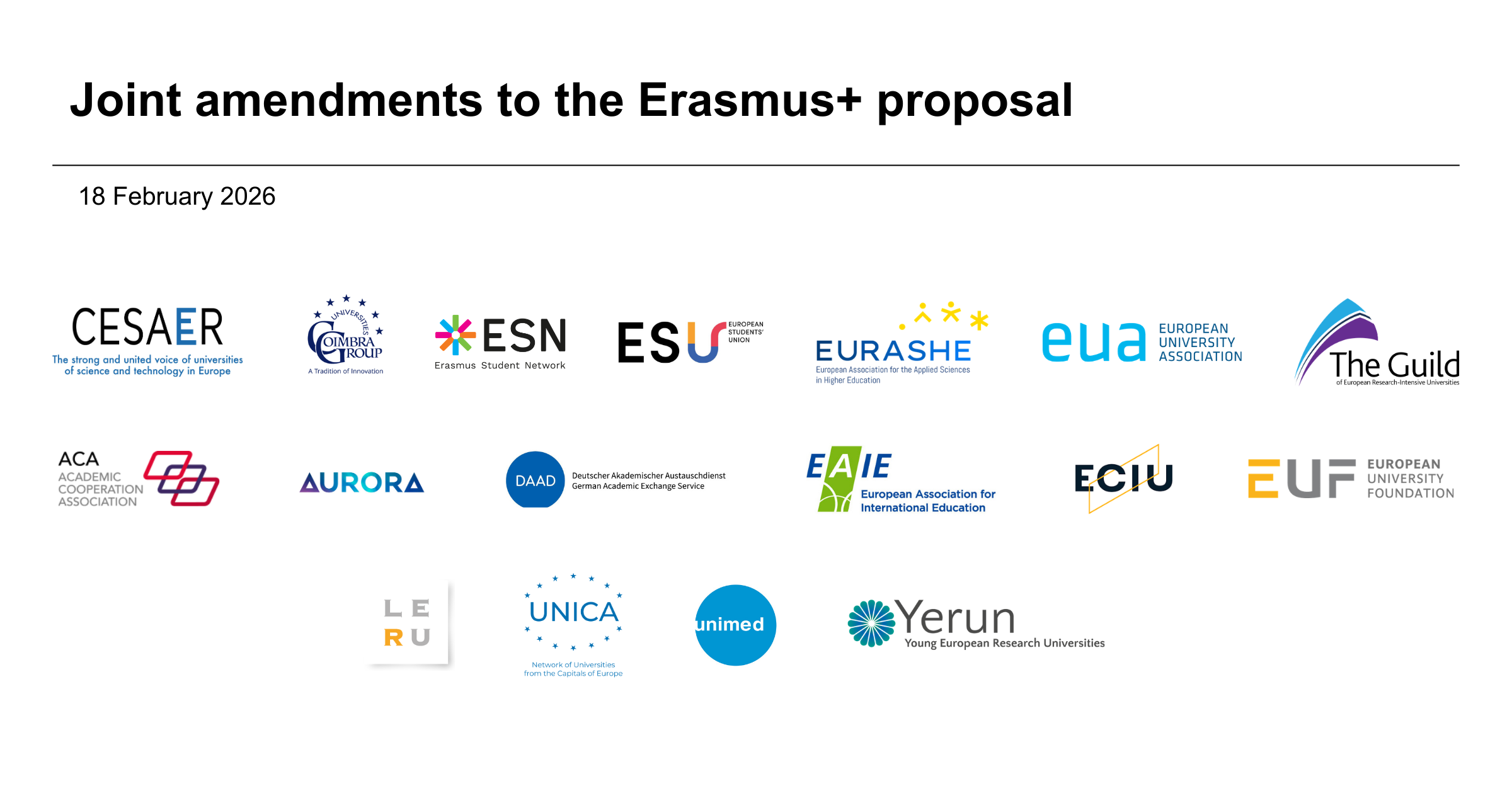The University of Rijeka, Faculty of Tourism and Hospitality Management in Opatija, is the only institution in the Republic of Croatia fully focused on education, human resources development, and scientific research in the field of sustainable development with emphasis on tourism at all levels of education. Students are offered a vertical education starting with the undergraduate study in Management of Sustainable Development (4 years, 240 ECTS), the postgraduate study in Sustainable Tourism Development (1 year, 60 ECTS), and the postgraduate university doctoral studies in Management of Sustainable Development (3 years, 180 ECTS).
In addition to formal education, students and faculty employees are engaged in various extracurricular activities that promote the Sustainable Development Goals.
To implement the principles of sustainable development in everyday study and business, an Eco-Committee has been established at Faculty, composed of students’ representatives from all years of study, representatives of employees (teaching and administrative staff), representatives of local associations, and representatives of local self-government units. Meetings are held twice a month and various activities related to social and environmental issues are organized.
Nika Kurti, student, says: “To me, sustainability means making conscious and active choices in your everyday life. Sustainability can be implemented in every aspect and every area of your life: in your habits, at work, and even in your education. It is an innovative perspective that focuses on solving problems and caring for society, the economy, and the environment. And that is why students must be made aware of it from an early age.”
Filip Komšić, student, says: “Sustainable development is a balanced synergy of the major goals that humanity should strive to achieve to ensure a secure and prosperous future for civilization, a nation, an organization, or the world as a whole. It is a set of standards applicable to almost all economic, social, and environmental conditions that provide realistic goals for improving the conditions of life and the state of our world.
The importance of research and learning about sustainable development lies in understanding standards that help us address modern economic, social, and environmental problems at many levels, adapt to and overcome coming challenges, and most importantly, enable security and development opportunities for future generations.
It is not only necessary to understand the concept of sustainable development so that we can help achieve its goals for the benefit of all, but also morally right.“
Prof. Marinela Krstinić Nižić, Ph.D., says: “In class, I teach students how the linear model of the economy should be transformed into a circular economy and how items should be repaired or repurposed rather than discarded. In addition to theoretical knowledge, students prefer practical knowledge where, through discussion and teamwork, they become aware that they are bearers of change in terms of resources (energy, water, space…). My role as a teacher is to transform leading sustainable ideas into action at our Faculty. Thus, FTHM proves that it is thinking about a “green” future.”
Some of the activities held are:
- BLUE CLEANUP
The World Clean-Up Day beach clean-up campaign took place on September 18, 2021. Blue Clean-Up – Let’s do it Mediterranean is a joint one-day action to clean the sea, underwater environment, and coastal areas. It is part of the regional project Let us do it Mediterranean, in which the countries of the Mediterranean participate with the common goal of a clean Mediterranean Sea. FMTU students and staff celebrated World Cleanup Day on the beaches of Kostrena, where the action was organized to collect cigarette butts and plastic waste. The action was organized by the initiative “Backtoblue” Liburnia d.d. in cooperation with the SAILING CLUB GALEB, the Association of Shipping Agents of Croatia, the Adriatic Ship Supply Agency, Express Global and the Faculty of Tourism and Hospitality Management, and about 200 volunteers participated. The goal is to make students and citizens aware of the need to protect the environment and the sea on which and with which they live. The sea and natural beauties are the basis for sustainable tourism in Croatia, and sufficient attention must be paid to environmental protection in this regard. More information available here (in English)
- ANTI-BULLYING DAY (PINK SHIRT DAY)
Pink Shirt Day – Anti-Bullying Day on Feb. 23, when students and employees wear a pink shirt with the message “Violence stops here!”. This commemorative day highlights the fight against bullying and that the Faculty is a place of zero tolerance for violence. This day is celebrated around the world, and we are pleased that FMTU is also contributing to Anti-Bullying Day. View the post on TV here (in Croatian only)
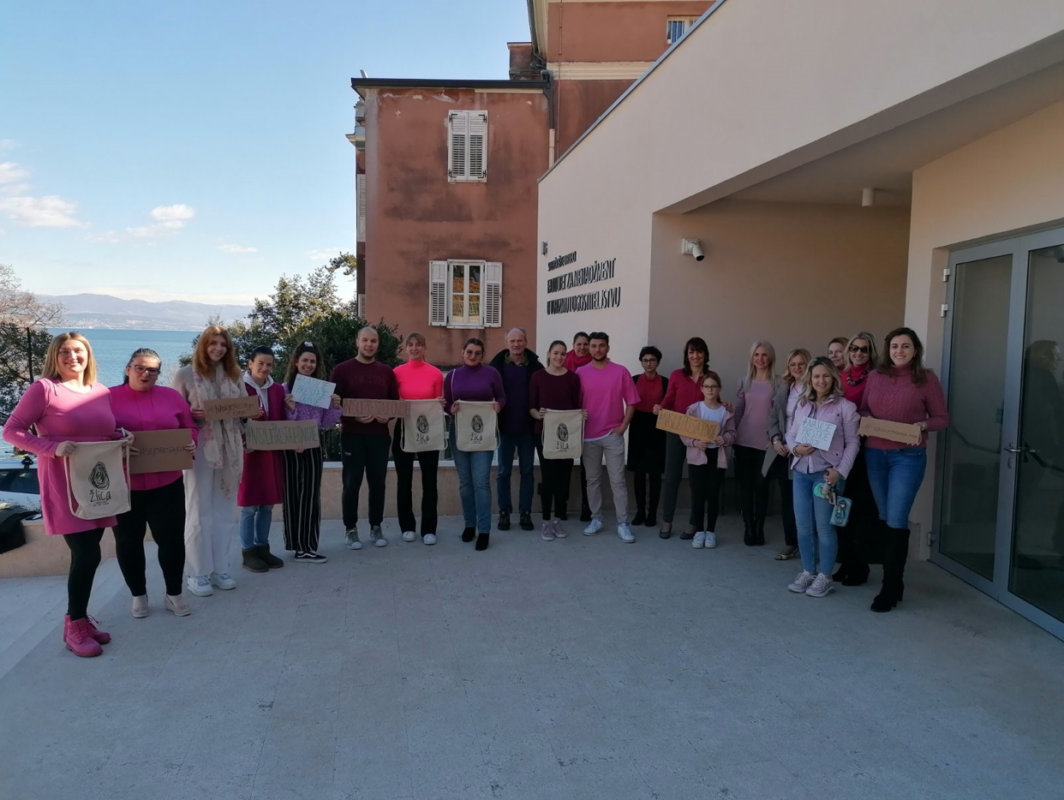
- DIGITAL CLEANUP DAY
World Digital Cleanup Day takes place around the world every year on March 19, and so FMTU also participated in this day. National Digital Cleanup Day is part of the Green Purge campaign coordinated in Croatia by the Žmergo Association with financial support from the Central State Office for Demography and Youth, the Ministry of Science and Education, and the City of Opatija.
The workshop was led by Diana Kovačić, president of the Žmergo Association. Students became aware of their knowledge about their online habits to reduce their digital footprint and introduce digital hygiene.
- ECO-RECIPES
Students design eco-recipes twice a month that is posted on social media. The goal of the eco-recipes is to make students and faculty aware of the environmental footprint of certain foods, which may also be simple and available from local producers.
- GREEN CLEANUP
As part of the Green Cleanup, which took place on April 13, 2022, students of Undergraduate study Management of sustainable development, members of the Eco Committee with the support of Prof Marinela Krstinić Nizić, Ph.D., representative of the Žmergo Association, and volunteers from Portugal rolled up their sleeves and invested their time and energy for a better and cleaner future.
Hardworking students cleaned the large terraced area next to the faculty of trash, packed and removed accumulated foliage in a matter of hours, and soon the area appeared in a brand-new, green, and clean robe. With satisfied faces, they said that this was a special opportunity to realize a plan they had had in mind for a long time, namely to set up an outdoor classroom that they would place in this very spot.
- 17 SUSTAINABLE DEVELOPMENT GOALS (SDGs)
Posters with the 17 Sustainable Development Goals (April 14, 2022) were also distributed in April to show students and employees their willingness to abandon the “business as usual” model and move toward sustainable development that focuses on social responsibility, protection, and restoration of nature. With this poster, which was also presented virtually in front of the Faculty Library, students are saying that they want to and can preserve our only home, planet Earth, in the best way possible.
The actions were also of international significance, as they were joined by two young volunteers from Portugal who will spend a month in Žmerg as part of “We are United” – an international mobility project implemented through the European Solidarity Corps program and funded by the European Union. Representatives of the Žmergo Association presented the possibility of voluntary service abroad at the information picnic in the cleaned area.
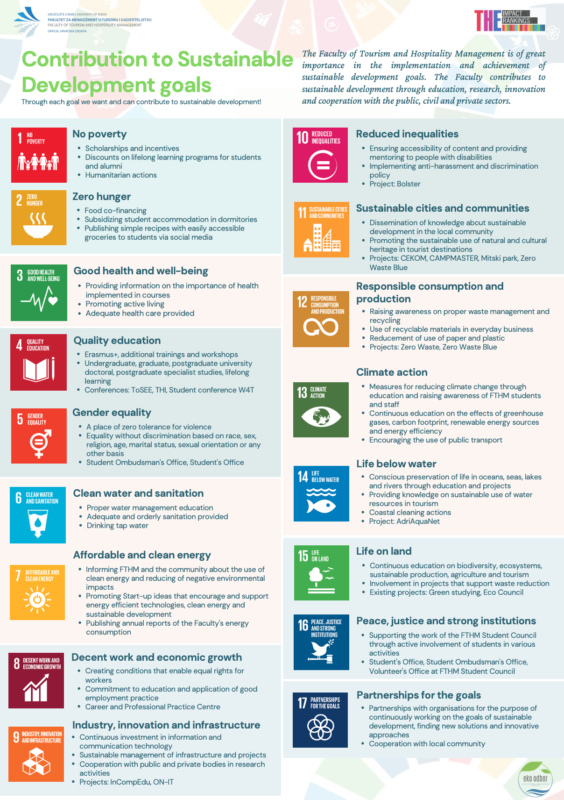
- BIODIVERSITY
Students also made birdhouses as part of the sustainable development classes to raise awareness of the importance of biodiversity for tourism, contributing to SDG 13 Climate Change Goal and SDG 15 Sustaining Life on Earth.
- STUDENT TIPS TO SAVE ENERGY AND WATER
To contribute to SDG Goal 6 Clean Water and Sanitation and Goal 7 Affordable Energy from Clean Sources, and as energy costs continue to rise, students created energy conservation tips to improve energy efficiency.
- GREEN LIBRARY
Among the praiseworthy activities, it is worth noting that in the Faculty Library there is a “Green” corner with books and articles thematically related to sustainable development, climate change, energy efficiency and ecological footprint, all based on examples from tourism.
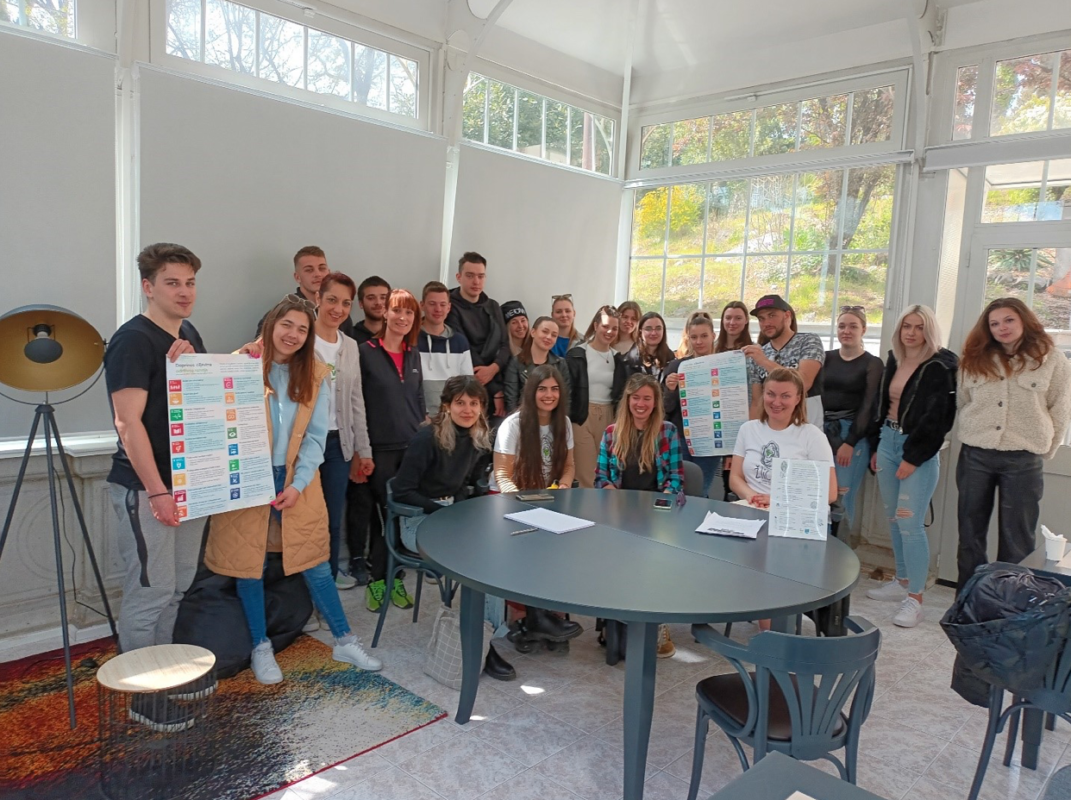
More information:
- Undergaduate study Management of sustainable development: https://www.fthm.uniri.hr/en/study-programmes/undergraduate-study/management-of-sustainable-development
- Graduate study Sustainable tourism development: https://www.fthm.uniri.hr/en/study-programmes/graduate-studies/sustainable-tourism-development
- Postgraduate University Doctoral Studies Management of Sustainable Development: https://www.fthm.uniri.hr/en/phd-mor-about
- Pink Shirt Day https://kanal-ri.hr/rijeka/svako-cetvrto-dijete-u-hrvatskoj-izlozeno-je-vrsnjackom-nasilju (in Croatian only)

